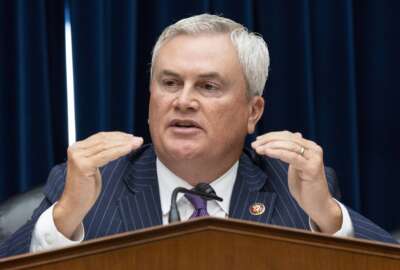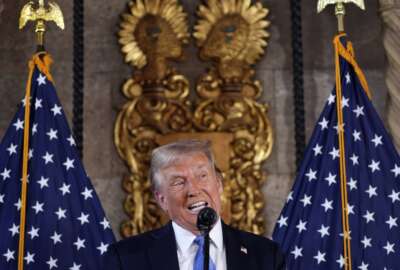Federal union clashes with Labor Dept over return-to-office announcement
Labor Dept. feds will soon have to work onsite at least half the time, the agency announced. But the federal union representing those workers is pushing back.
Federal union officials are urging the Labor Department to return to the bargaining table and walk back a recent return-to-office announcement affecting thousands of agency employees.
Labor Department Acting Secretary Julie Su announced last week that most bargaining unit employees would have to report to work onsite at least five days per pay period beginning Dec. 1. The announcement came after nearly a year of intermittent negotiations between the National Council of Field Labor Locals (NCFLL) and agency leaders.
“I know the implementation of the five-day requirement may impact the work-life balance of those of you to whom it applies and do not take this decision lightly,” Su wrote in the Oct. 11 email, obtained by Federal News Network.
In the email, Su specified that “onsite” work doesn’t necessarily mean reporting to the office and can include field work as well. For instance, an Occupational Safety and Health Administration (OSHA) inspector out in the field surveying a facility could count that workday as an onsite day.
The return-to-office changes announced last week do not apply to employees in the National Union of Labor Investigators (NULI) bargaining unit or employees in Labor’s inspector general office. Other Labor employees who are not part of a bargaining unit have already been working in person five days per pay period for several months. Su said Labor leaders are still negotiating with NULI over return-to-office changes, but that the agency had “met any labor management obligations it may have had in advance of implementation” for the some 7,500 Labor employees in NCFLL.
“The department has engaged with NCFLL over the course of several months to obtain the union’s input into matters affecting employees in their bargaining unit,” Su wrote.
NCFLL, a component of the American Federation of Government Employees, said in an Oct. 15 response to Su’s email that the union “takes exception” to Labor’s statement that negotiations are complete. Daryl Laurie, president of NCFLL, called the agency’s return-to-office announcement “extremely disappointing.”
“We expected better,” Laurie said in an interview with Federal News Network. “There’s still an outstanding negotiability appeal that needs to be resolved. The implementation should not occur until that decision is made, and if it’s found that our proposals are negotiable, we should be able to continue the collective bargaining process.”
The Labor Department declined to comment beyond what was written in Su’s Oct. 11 email.
Return-to-office should not be “one-size-fits-all”
NCFLL, part of the American Federation of Government Employees, represents 7,500 Labor employees working in a wide range of positions, including OSHA compliance officers, wage and hour investigators, mine inspectors and employee benefit auditors. Laurie said the union believes telework and return-to-office arrangements should be an agreement between a supervisor and an employee, rather than what he said is a “one-size-fits-all” requirement.
“There may be some employees that need to be in the office more than five days of pay period, but there may be other employees where the supervisor in the employee come to an agreement that, yes, you can telework eight days a pay period, or you can telework six days a pay period,” Laurie said.
The type of work that bargaining unit employees do varies greatly. While some work requires employees to be onsite and out in the field, other work tasks involve employees filling out paperwork, writing reports or making phone calls.
“Maybe you don’t need to be in the field every single day — you might be able to telework more than half of your time. But that’s always been worked out between the supervisor and the employee, and that’s what we’re asking for here,” Laurie said. “What is not beneficial is just putting a five day per pay period, across the board requirement for everyone. We’re a diverse department with diverse work responsibilities.”
NCFLL is trying to bring more attention to its concerns by reaching out to Congress. In an Oct. 4 letter sent to the Senate’s Health, Education, Labor and Pensions Committee, the union asked Committee Chairman Bernie Sanders (I-Vt.) to urge the agency to bargain “in good faith.”
“To be clear, there is no indication that Acting Secretary Su is personally to blame,” the union wrote in its letter to Sanders. “However, by their actions, the Department of Labor has done President Biden, DOL’s employees, their unions and the workers they serve and protect a great disservice.”
Union considering options with the FLRA
Labor-management negotiations over the agency’s return-to-office policy have continued through the better part of 2024. Labor leadership initially planned to move bargaining unit employees to a five day per pay period requirement back in January. But those plans were delayed after the agency said it needed to first finish bargaining obligations with its unions.
Since then, over the past several months, Labor and NCFLL have worked with a mediator on the Federal Mediation and Conciliation Service (FMCS) and sought assistance from the Federal Service Impasses Panel (FSIP). But so far, those efforts have not resulted in an agreement between the two parties.
FSIP mediated an 11-hour proceeding in August, but it did not lead to a settlement between the two parties. Labor leadership then submitted a brief declaring that NCFLL’s telework proposals were “non-negotiable,” saying they interfered with the agency’s ability to assign work and direct employees. Following the brief, FSIP dismissed the case due to a lack of jurisdiction.
In FSIP’s Sept. 25 letter dismissing the case, FSIP Chairman Martin Malin noted “concerns” over how the Labor Department acted in the dispute, particularly considering the more than 80-day period between when NCFLL first went to the panel for assistance, and when Labor eventually declared telework a “non-negotiable” topic.
“In those 80 days the panel and its representatives devoted significant resources to seeking resolution via investigation, caucuses and mediation,” Malin wrote. “The agency never indicated an intent to raise a negotiability argument other than [an Aug. 8 statement] that it walked back the next day. The agency’s post-hoc decision to raise this argument has resulted in an ineffective and inefficient expenditure of taxpayer funded resources that cannot be justified in light of the results.”
“While the union respects DOL’s right to raise a negotiability claim, there is no justification for declaring the NCFLL bargaining proposals as non-negotiable after the impasse hearing had taken place, wasting time and taxpayer dollars,” AFGE wrote in a press release.
Laurie said the union is now considering various options for action with the Federal Labor Relations Authority (FLRA), including the possibility of filing an unfair labor practice (ULP) complaint.
Copyright © 2025 Federal News Network. All rights reserved. This website is not intended for users located within the European Economic Area.
Drew Friedman is a workforce, pay and benefits reporter for Federal News Network.
Follow @dfriedmanWFED






